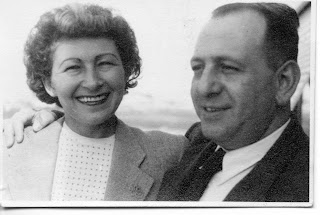On their wedding day, my great- grandparents gifted my grandmother, Hanni—and her new husband, David with a beautiful silver menorah. In their wedding photo from Berlin in the 1920’s, the couple stares straight into the camera with slight, posed smiles. She looks fashionable and elegant in her white gown with the large bow in front—and he dapper in his tweed suit and bow tie. My grandparents were introduced by a matchmaker. Both families were part of a large community of Polish Jews who had fled pogroms and persecution to find safety and build prosperous new lives for themselves in this vibrant, cosmopolitan German city.
David owned a leather
goods store and was an international grand master in chess. He played on the German national team. He spent hours and hours playing chess and
studying moves. Hanni was. a secretary
in her father’s cardboard box factory.
She loved to dress up and to go out and socialize. She had no appreciation at all for chess and
considered it a complete waste of time.
One day, she grew so furious with David that she shouted and violently
knocked all of the chess pieces off the board.
He said nothing, just very calmly picked up the pieces, putting each
back on the board exactly where it had been, and continued on with his
game.
When Hitler came to power, my grandparents and extended
family (including my father, Jacob—a 7 year old boy) fled Germany---taking the
silver menorah with them. They emigrated to Palestine (now Israel). The base of the menorah is hollow, and in
it—they hid a large bar of silver as they escaped the Nazis. My great-grandfather bought an apartment
building in Tel-Aviv—a few blocks from the beach, and many members of the
extended family moved in there. My
father spent much of his childhood there— surrounded by cousins, aunts and
uncles. There must have been many
festive, large Hanukkah celebrations with the silver menorah.
Hanni and David wound
up getting divorced (which was quite unusual in those days), and my grandmother
eventually re-married. She and her new
husband started a wholesale clothing business.
They created ladies dress suits and coats. My “Opa”, Erich Stock, imported all the
materials—including bales of wool from Europe-- and Hanni created the fashions. They had three tailors working for them, as
they sold their clothing to retail stores all over Palestine. I have
a picture of them from this time period with their arms around each other,
smiling happily. Hanni is dressed very
elegantly, probably in one of the suits that she designed herself and Erich,
too is wearing a suit and tie.
My father, Jacob, travelled to the United States by ship on a student visa when he was in his early 20’s. After many varied adventures, he wound up pursuing a graduate degree in physics. He met my mother, Hilda, while they were students at the University of Wisconsin in Madison. She fell head over heels for this handsome young man from the new state of Israel—which most Jewish people idealized in the 1950’s as a pioneering nation, a safe haven for the Jews who were returning and rebuilding their ancient lands. My mother grew up in Green Bay, where her family was part of a thriving Jewish community. Jacob and Hilda married in a snowstorm in late January, 1954, at the Green Bay synagogue. Hanni and Erich gave my parents the silver menorah as a wedding gift.
From Wisconsin, my parents, their growing family, and the silver menorah journeyed to New Mexico (where my father worked at the Los Alamos nuclear lab), then Pennsylvania (where he worked for GE), and finally to the University of Kansas, where he settled into being a professor. Growing up in Kansas, being Jewish was a bit of a novelty. One year, a newspaper photographer came to our house—and a picture of our family lighting the Hanukkah candles was featured on the front page of the Lawrence Journal World.
In this grainy black and white photo, my father with his bald head and 1970's sideburns— solemnly lights the silver menorah—as he chants the ancient blessing. My mother, sister, brother and I gaze earnestly into the flickering flames. Had the photographer caught us a few minutes later, we would have been acting silly or arguing, but in that moment we were the picture perfect Jewish family observing a ritual passed down from generation to generation for more than two thousand years. We always followed the candle lighting with two songs in Hebrew-- “Maoz Tsur” (or Rock of Ages) and “Mi Yimalel”--which we sang with great gusto. Then came the great excitement of giving and receiving presents!
Who could ever have imagined in
Berlin in the 1920’s that this silver menorah would make its way from Germany,
to Israel and across the United States? That
it would survive the Nazis and be lit during a global pandemic? Who knows where
its future journey will take it and what new generations and technologies it
will witness?? May its light continue to
burn brightly through whatever darkness and chaos and hopes and dreams lie in
the years ahead….





